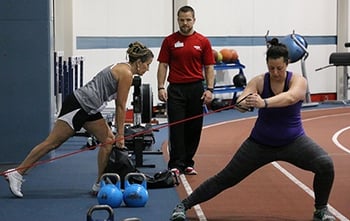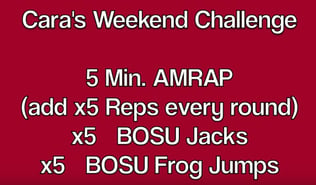Most of us have specific goals in mind when it comes to an exercise program. We work hard to achieve these results day in and day out, but sometimes our bodies may need an extra push to get over that hump. Many people question the importance of adding supplements to a healthy diet and workout routine, as well they should.
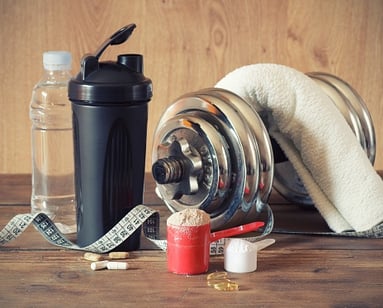 With so many different supplements flooding the shelves these days, it’s hard to know which ones will truly help you achieve your desired results. Although I agree that some supplements might not be necessary to include in your program, others could be beneficial to many individuals no matter what their fitness goals are.
With so many different supplements flooding the shelves these days, it’s hard to know which ones will truly help you achieve your desired results. Although I agree that some supplements might not be necessary to include in your program, others could be beneficial to many individuals no matter what their fitness goals are.
Not a Substitute for Proper Nutrition
Before I go any further, I want to note that supplementation is simply an addition to your diet and exercise regime. These are not meant to replace a well-balanced whole-food diet; they are meant to be used in conjunction.
Most of the nutrients we need are already being produced by our own bodies to a certain extent, as well as existing in foods we eat daily. Some essential nutrients such as protein, creatine, and branched-chain amino acids (BCAAs) are naturally produced in the body and can be found in meat products, including (but not limited to) red meat, fish, and ground turkey. These amounts are just large enough to support daily functioning, but may not be produced in large enough quantities to aid in dramatic physique enhancements. If you are looking to take your physique to the next level, supplementation might be just what you need.
Which Ones Should I Use?
Here are the top five supplements (in my opinion, and that of many top professionals) you could add to your exercise and diet program.
- Branched-chain amino acids (BCAAs): BCAAs are essential nutrients that help the body slow down protein and muscle breakdown, which can aid in preventing muscle fatigue during intense workouts. It works by stimulating the building of protein in muscles, which in turn helps prevent muscle breakdown. I would not recommend using BCAAs when trying to gain muscle hypertrophy (or size), as muscle breakdown is essential for muscle growth. Instead, try a pre-workout or caffeinated drink before your workout for extra energy.
- Creatine: Creatine is an organic acid that is produced in the liver and helps supply energy to cells all over the body (especially muscle cells). People take creatine because it allows the body to produce more energy, and with more energy a person is able to increase the intensity of their workouts. Many athletes use creatine to improve their overall performance. It also helps aid in quicker muscle recovery after an intense workout.
- Protein: Your muscles need protein grow and recover from muscle breakdown caused by exercise. You can get plenty of protein in your diet; however protein shakes are generally lower in calories than a high-protein meal. They are also portable and more convenient that carrying around whole-food meals (here are some ideas for making your own). Two widely used proteins are whey and casein. Whey is a fast-digesting protein that aids in muscle recovery and muscle growth. Casein is a slow-digesting protein that creates a longer-lasting supply of muscle-building nutrients. Many experts recommend taking a mixture of the two proteins to ensure a release of amino acids into the blood for as long as possible, therefore aiding in lean muscle gain as well as body fat decline.
- Multi-vitamins: Multi-vitamins are essential to support the body’s everyday functioning. Your body needs a variety of complex nutrients for optimum efficiency and performance. Taking a high-potency multi-vitamin can ensure your body is getting those essential nutrients to support thousands of metabolic reactions. Here’s more information on the importance of a multi-vitamin for your health and fitness goals, including a list of the essential vitamins and minerals you need.
- Fish oil: Fish oil tablets are the most efficient way to get the purest and most concentrated dose of Omega-3s into your diet. Omega-3s have been proven to improve blood circulation, which in turn will allow nutrients such as protein and carbohydrates to reach muscles. Omega-3s also help with maximizing metabolic rate, which in turn helps with fat loss.
Dietary supplements can have many health benefits as well as many performance-based benefits. If you are not concerned with taking supplements for their potential performance enhancements, you should at least be taking supplements such as multi-vitamins and fish oil tablets for your general health. They can be an easy addition to your diet and exercise regimen that may have huge effects on your overall health. Add supplements on an as-needed basis after conducting a needs analysis, and implement one at a time.
If you have additional questions or concerns about supplementation, please stop by and ask any Health Fitness Specialist at NIFS or contact our Registered Dietitian, Angie Mitchell for more information.


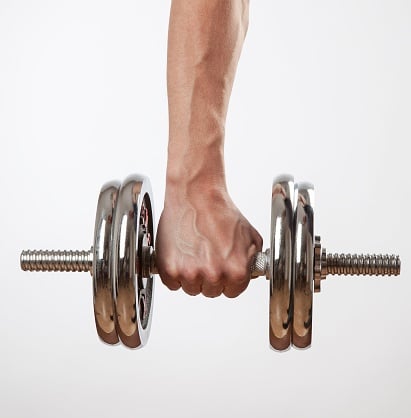 Grip strength is quite a conundrum in the fitness industry. It is so often called upon during training, yet grip-strength training itself can be overlooked.
Grip strength is quite a conundrum in the fitness industry. It is so often called upon during training, yet grip-strength training itself can be overlooked. 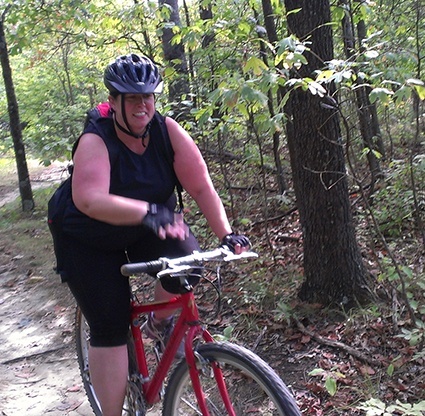 There comes a time when a story of struggle, strife, and success must be shared to remind others that you are never alone in your battle, and that achievement and happiness are closer than you may think. Katie Feltman has such a story.
There comes a time when a story of struggle, strife, and success must be shared to remind others that you are never alone in your battle, and that achievement and happiness are closer than you may think. Katie Feltman has such a story.  You’d think with the scary words the doctor was saying I would have walked out of there that day and taken charge of things right then. But change isn’t like that—not for me, at least. I was frustrated with how I felt, and I know this will sound superficial but it is true: I hated how I looked, which I didn’t realize then but now know was key to my struggle. Self-hate = no self care, and that was how I was living my life. I was living life in a muted capacity, and I lacked the motivation to do something about it—any of it.
You’d think with the scary words the doctor was saying I would have walked out of there that day and taken charge of things right then. But change isn’t like that—not for me, at least. I was frustrated with how I felt, and I know this will sound superficial but it is true: I hated how I looked, which I didn’t realize then but now know was key to my struggle. Self-hate = no self care, and that was how I was living my life. I was living life in a muted capacity, and I lacked the motivation to do something about it—any of it.
 Okay, so maybe you’re not a morning person, and would much rather remain cozy in your queen-sized bed for several hours after waking up before finally finding the energy and motivation to make your way to the gym during the middle of the day. Maybe you’re the type of person who likes to take care of your priorities first during the day, and then only if left with enough time sneak in a late-afternoon or nighttime workout before ending your day.
Okay, so maybe you’re not a morning person, and would much rather remain cozy in your queen-sized bed for several hours after waking up before finally finding the energy and motivation to make your way to the gym during the middle of the day. Maybe you’re the type of person who likes to take care of your priorities first during the day, and then only if left with enough time sneak in a late-afternoon or nighttime workout before ending your day.
 Have you ever gone into the gym and jumped right into your workout, only to notice that it took a good 20 minutes to get into it? Or how about heading out for a run without any form of warming up, and you really don’t start to feel into your rhythm until halfway through?
Have you ever gone into the gym and jumped right into your workout, only to notice that it took a good 20 minutes to get into it? Or how about heading out for a run without any form of warming up, and you really don’t start to feel into your rhythm until halfway through?  Salutations, NIFS friends. Picture yourself running across the finish line or standing on the winner’s podium at a major marathon event, scoring a touchdown in the Super Bowl, or even finishing up your final set of EZ Bar preacher curls. (Wait, what was that?) Now that you are wondering what I am getting to here, I must say that all three of those events have something in common, and that is the accompaniment of music.
Salutations, NIFS friends. Picture yourself running across the finish line or standing on the winner’s podium at a major marathon event, scoring a touchdown in the Super Bowl, or even finishing up your final set of EZ Bar preacher curls. (Wait, what was that?) Now that you are wondering what I am getting to here, I must say that all three of those events have something in common, and that is the accompaniment of music. 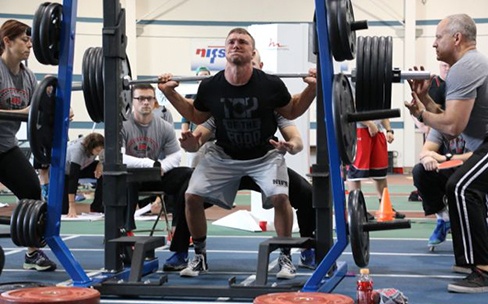 The fitness center floor was transformed into a makeshift coliseum so all could witness the battles that took place on those power racks and platforms. One could easily learn a great deal about the art of powerlifting, but I witnessed some rather big life lessons on display that were just as powerful as our two champions!
The fitness center floor was transformed into a makeshift coliseum so all could witness the battles that took place on those power racks and platforms. One could easily learn a great deal about the art of powerlifting, but I witnessed some rather big life lessons on display that were just as powerful as our two champions! 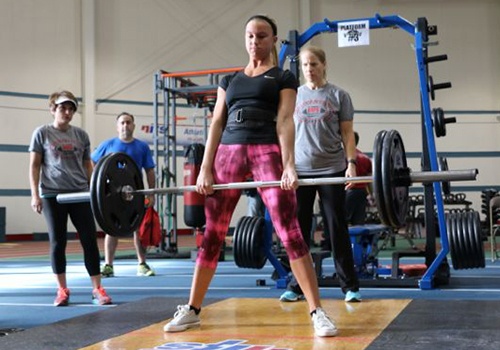
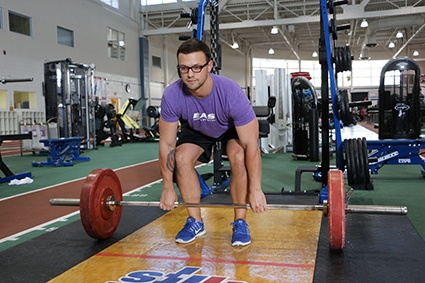 At times you may hear somebody at the gym or fitness center saying, “I don’t want to look like a bodybuilder,” or “I don’t want to be a powerlifter.” That’s great! That person knows their goals and also what they want to avoid. However, don’t let your specific goals cause you to have myth-generated fears of certain exercises.
At times you may hear somebody at the gym or fitness center saying, “I don’t want to look like a bodybuilder,” or “I don’t want to be a powerlifter.” That’s great! That person knows their goals and also what they want to avoid. However, don’t let your specific goals cause you to have myth-generated fears of certain exercises. 
